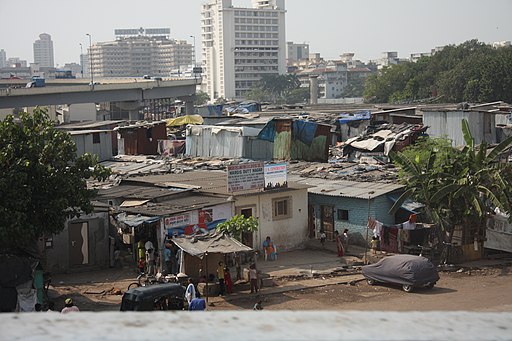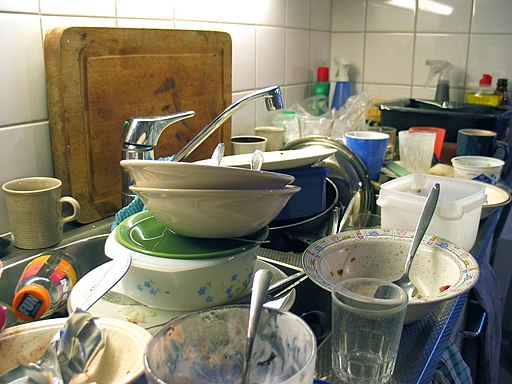Today on Facebook I happened to find a shocking and sad gallery -- Google street view photos of Detroit, showing its
descent into a post-apocalyptic wasteland.
It got me thinking again about a question I've always wondered: Just why is it that poverty and squalor seem to go hand-in-hand? Why is it that a low income leads so inevitably to deplorable living conditions in terms of sanitation? On the surface, it doesn't make a whole lot of sense: Why would being poor make it harder to clean your house?
But the connection is certainly there, so much so that it's intuitive: When we see a run-down neighborhood, we immediately associate it with poverty. We have a strong association in our minds between "poor" and "dirty," and I think that's one reason why there's such an instinctive reaction of disgust or disdain toward people living in or near poverty.
There's a huge stigma, an oroboros of filth: We're afraid of being perceived as poor, in case people think that we're dirty, and we're loathe to be seen dirty, in case people think we might be poor.

So what's the deal?
Squalor and poverty collide for a number of reasons. Like most things in life, it's not really simple:
- Poor people can't afford nice things, and they can't afford to replace what they have when it breaks. Stained clothing, broken-down cars, household damage etc.
- Poverty quite often coincides with mental illness. Perhaps being poor has led to depression, or maybe mental illness has made it impossible to find work. In any case, people who are struggling with mental illness might have a hard time maintaining their homes.
- Similarly, many of the nation's poor are elderly or physically disabled. These people are not physically able to maintain their homes and can't hire someone else to come in and do it for them.
- The "working poor" are probably too busy handling multiple jobs to spend a whole lot of time maintaining their homes. And if they have small children and/or pets, those homes can get messy quickly.
- Poverty and substance abuse sometimes intersect, for various reasons that deserve a post of their own. Like mental illness, drug use can inhibit your ability and desire to maintain a home. It also tends to be a social type of lifestyle, so the user might have frequent "guests" coming and creating a mess as well.
- There's a lack of infrastructure in truly impoverished areas. Things like trash pickup and sewer line maintenance tend to require the help of a municipal service. If that doesn't exist for some reason -- lack of funding, extremely rural location -- then the task may not be completed.
Regardless of how the mess came to exist, once it gets set, it's easy for it to snowball. And thanks to our cultural perceptions of wealth and filth, it can be extremely difficult to get out of this position: You feel ashamed, which leads to depression, which makes it hard to get out of bed, much less tackle an ever-growing mountain of filth.

What if it's YOUR House?
Thanks to all the baggage associated with it, most of us without much money don't want to admit to being poor, and we definitely don't want to admit to being dirty. But the fact is, sometimes you look at your kitchen and realize that you have a towering pile of dishes, or trash that hasn't been taken out, or that your puppy shredded a role of toilet paper all over the hallway and you haven't had the heart or the energy to deal with any of it.
Maybe you even have a mean little voice in the back of your mind saying
You are poor and live in squalor. That's just who you are now.
And so maybe you believe that voice, and maybe you get overwhelmed, and maybe you put off the hard work because it's exhausting and depressing and your life is already really hard.
Fortunately, there are a few resources to help people who have slipped into this position, providing actual solutions without judging you for them. One of these, a project I really appreciate and respect, is
Unfuck Your Habitat (UFYH). The thing I love about UFYH is that they're totally non-judgmental and recognize that people are coming from different backgrounds or might have different limitations. Yes, it's a little vulgar and irreverent (two things I happen to appreciate, but your mileage may vary), but it's also got some very solid advice.
Here's their mission statement:
And our homes aren’t the only things that need to be unfucked. Our
finances, our jobs, our relationships: there’s no end to the things we
can fuck up. The important thing to remember is that there is nothing
that can’t be unfucked. You just have to do it.
No, I'm not being paid by these guys to write about it. I just genuinely think it's a cool resource.
If UFYH is a little much for you, you can also check out T
he Flylady, who's also very practical but a lot more "domestic" and traditional. Either way, the great thing about these sites is that they offer you some practical steps for dealing with the mess and finding your way out of it.
Part of owning your income -- even when it's minimal -- is being proud of what you have. You might not have much, but if you learn to take care of it, people will treat you differently and you will feel differently about yourself.
As you learn new domestic skills (making your own cleaning solutions, minimizing your possessions, composting your trash and reducing your waste), you'll find your home easier to maintain. But right now, today, if you're standing at ground zero -- don't let the shame take over. Take a deep breath, and make a plan, and decide once and for all that being poor doesn't mean you have to be dirty.




